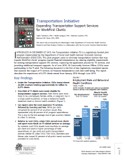The Transportation Initiative (TI) was a legislatively funded pilot program implemented by the Department of Social and Health Services' Economic Services Administration (DSHS-ESA) across 26 Community Service Offices (CSOs) in Washington State. The TI pilot sought to reduce WorkFirst clients' barriers to financial independence by improving access to transportation support (TS) services and expanding the range of available TS services. This report summarizes the $2 million in TI program service and voucher expenditures and the characteristics of clients served from January 2016 through June 2019. A companion report will evaluate the impact of the TI on CSO-level measures of financial independence, caseload, and WorkFirst sanction rates.
Report and/or Additional Information:
Categories:
Related Publications:
- Adults on TANF in Washington State (11.158)
- Behavioral Health Risk among TANF Parents: Links to Homelessness, Child Abuse and Arrests (11.153)
- Characteristics of Public Housing Assistance Recipients in Washington State (11.223)
- Children on TANF in Washington State (11.159)
- DSHS Children’s Administration/TANF Concurrent Benefit Program: Costs and Reunifications for SFY 2009 Removals (11.189)
- DSHS Economic Services Administration Service Trends Before and During the COVID-19 Pandemic (11.264)
- Effect of TANF Concurrent Benefits on the Reunification of Children following Placement in Out-of-Home Care (11.198)
- Housing Matters: Characteristics and Experiences of TANF Clients by Housing Status (11.211)
- Impact of Housing Assistance on Outcomes for Homeless Families (11.219)
- Predicting Homelessness among Low-Income Families on TANF (11.224)
- Serving TANF Families with Limited English Proficiency (6.53)
- TANF Caseload Changes: The Well-Being of Parents and Children Leaving WorkFirst in Washington State (11.280)
- TANF Caseload Decline (11.216)
- TANF Supported Employment Pilot Participant Characteristics (6.60)
- Transportation Initiative: Evaluating the Impact of Expanded Transportation Support Services on Community Service Office Outcomes (6.67)
- WorkFirst Parents in Vocational Education at State Community and Technical Colleges: The Role of Basic Food Education & Training (6.62)

